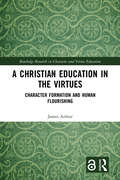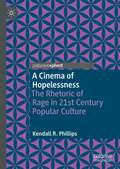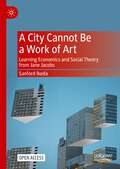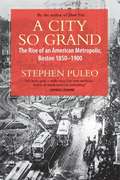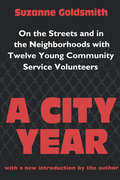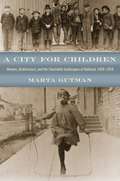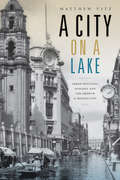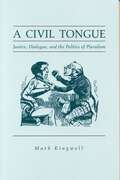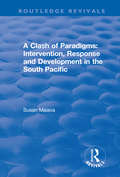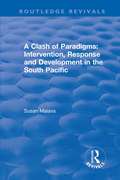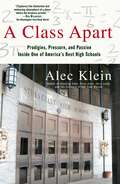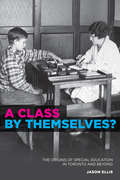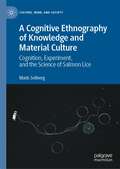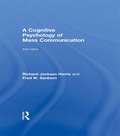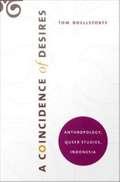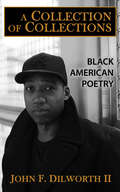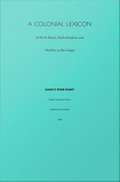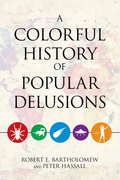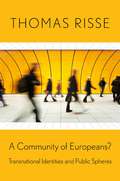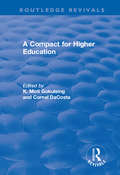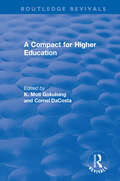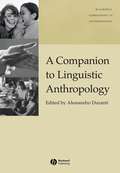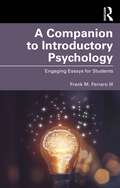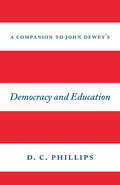- Table View
- List View
A Christian America: Protestant Hopes and Historical Realities
by Robert T. HandyA study of Protestantism in America which traces the efforts of main line denominations to fully Christianize the United States beginning with an overview of the colonial history of religion and focusing primarily on the 19th and early 20th centuries.
A Christian Education in the Virtues: Character Formation and Human Flourishing (Routledge Research in Character and Virtue Education)
by James ArthurA Christian Education in the Virtues examines the connection between human nature and human flourishing. It draws on ancient and medieval sources to explore the formation of the person based on a Christian anthropology, emphasising the communal nature of the virtuous life and provides a richer approach to the question of contemporary character education. The book argues that the only way to understand and construct our character virtues is to have a clear picture of what is the purpose and meaning of human life. It highlights the importance of engaging with moral issues and makes the case that, for Christian educators, human flourishing is inseparable from God’s active relationship to human beings. The book also explores a teleological approach to character education goals. To educate the whole person in the light of an all-embracing Christian worldview is challenged by secular and liberal ideology and is often seen as irrational to the modern mind. Overall, the text seeks to demonstrate that many aspects of a Neo-Aristotelian-Thomist theoretical underpinning for Christian character education holds out a viable option for Christians. It therefore argues the case for the educational potential of Christian character education. This important book will be essential reading for academics, researchers and students in the fields of character and virtue education, religious education and the philosophy of education.
A Cinema of Hopelessness: The Rhetoric of Rage in 21st Century Popular Culture (Rhetoric, Politics and Society)
by Kendall R. PhillipsThis book explores the circulation of anger and hostility in contemporary American culture with particular attention to the fantasy of refusal, a dream of rejecting all the structures of the contemporary political and economic system. Framing the question of public sentiment through the lens of rhetorical studies, this book traces the circulation of symbols that craft public feelings in contemporary popular cinema. Analyzing popular twenty-first century films as invitations to a particular way of feeling, the book delves into the way popular sentiments are circulated and intensified. The book examines dystopian films (The Purge, The Cabin in the Woods), science fiction (Snowpiercer), and superhero narratives (the Marvel Cinematic Universe and Joker). Across these varied films, an affective economy that emphasizes grief, betrayal, refusal, and an underlying rage at the seeming hopelessness of contemporary culture is uncovered. These examinations are framed in terms of ongoing political protests ranging from Occupy Wall Street, the Tea Party, Black Lives Matter, and the 6th January 2021 invasion of the US Capitol Building.
A City Cannot Be a Work of Art: Learning Economics and Social Theory From Jane Jacobs
by Sanford IkedaThis open access book connects Jane Jacobs's celebrated urban analysis to her ideas on economics and social theory. While Jacobs is a legend in the field of urbanism and famous for challenging and profoundly influencing urban planning and design, her theoretical contributions – although central to her criticisms of and proposals for public policy – are frequently overlooked even by her most enthusiastic admirers. This book argues that Jacobs’s insight that “a city cannot be a work of art” underlies both her ideas on planning and her understanding of economic development and social cooperation. It shows how the theory of the market process and Jacobs’s theory of urban processes are useful complements – an example of what economists and urbanists can learn from each other. This Jacobs-cum-market-process perspective offers new theoretical, historical, and policy analyses of cities, more realistic and coherent than standard accounts by either economists or urbanists.
A City So Grand: The Rise of an American Metropolis, Boston 1850-1900
by Stephen PuleoBetween 1850 and 1900, Boston underwent a stunning metamorphosis from an insulated New England town into one of the world's great metropolises--one that achieved worldwide prominence in politics, medicine, education, science, social activism, literature, commerce, and transportation. In A City So Grand, Stephen Puleo chronicles this remarkable period in Boston's history. He takes readers through the ferocity of the abolitionist movement of the 1850s, the thirty-five-year engineering and city-planning feat of the Back Bay project, Boston's explosion in size through immigration and annexation, the devastating Great Fire of 1872, and the glorious opening of America's first subway station in 1897. This lively journey paints a portrait of a half century of progress, leadership, and influence.
A City Year: On the Streets and in the Neighbourhoods with Twelve Young Community Volunteers
by Suzanne GoldsmithIn his inaugural address in 1993, President Clinton said: "I challenge a new generation of young Americans to a season of service to act on your idealism by helping troubled children, keeping company with those in need, reconnecting our torn communities." In the fall of 1990, Suzanne Goldsmith had signed on for her own "season of service" with City Year, the widely praised, Boston-based community service program frequently endorsed by political figures as a model for the nation. 'A City Year' is the story of Goldsmith's experience, an honest and gritty account of the triumphs and setbacks faced by an idealistic and experimental social program in its infancy. Together with a diverse team of young men and women--including a Burmese immigrant, a white prep-school graduate, a foster child, an ex-convict, and a black middle-class college student--Goldsmith helped renovate a building for the homeless, tutored school children, reclaimed a community garden from drug dealers, and organized a community street-cleaning day. The year Included backbreaking but gratifying work, the sense of family that comes from collaborative labor, and the potential strength of diversity. 'A City Year' is both the story of an uphill battle in urban America and an uplifting recipe for social change. As the AmeriCorps national service program dangles in the political wind on Capitol Hill, this book offers a true glimpse of what a "season of service" really means. It is a fascinating account for sociologists and all those with an interest in community service and youth.
A City for Children: Women, Architecture, and the Charitable Landscapes of Oakland, 1850-1950
by Marta GutmanAmerican cities are constantly being built and rebuilt, resulting in ever-changing skylines and neighborhoods. While the dynamic urban landscapes of New York, Boston, and Chicago have been widely studied, there is much to be gleaned from west coast cities, especially in California, where the migration boom at the end of the nineteenth century permanently changed the urban fabric of these newly diverse, plural metropolises. Ina"A City for Children," Marta Gutman focuses on the use and adaptive reuse of everyday buildings in Oakland, California, to make the city a better place for children. She introduces us to the women who were determined to mitigate the burdens placed on working-class families by an indifferent industrial capitalist economy. Often without the financial means to build from scratch, women did not tend to conceive of urban land as a blank slate to be wiped clean for development. Instead, Gutman shows how, over and over, women turned private houses in Oakland into orphanages, kindergartens, settlement houses, and day care centers, and in the process built the charitable landscapeOCoa network of places that was critical for the betterment of children, families, and public life. a The industrial landscape of Oakland, riddled with the effects of social inequalities and racial prejudices, is not a neutral backdrop in GutmanOCOs story but an active player. Spanning one hundred years of history, a"A City for Childrena"provides a compelling model for building urban institutions and demonstrates that children, women, charity, and incremental construction, renovations, alterations, additions, and repurposed structures are central to the understanding of modern cities. "
A City on a Lake: Urban Political Ecology and the Growth of Mexico City (Radical Perspectives)
by Matthew VitzIn A City on a Lake Matthew Vitz tracks the environmental and political history of Mexico City and explains its transformation from a forested, water-rich environment into a smog-infested megacity plagued by environmental problems and social inequality. Vitz shows how Mexico City's unequal urbanization and environmental decline stemmed from numerous scientific and social disputes over water policy, housing, forestry, and sanitary engineering. From the prerevolutionary efforts to create a hygienic city supportive of capitalist growth, through revolutionary demands for a more democratic distribution of resources, to the mid-twentieth-century emergence of a technocratic bureaucracy that served the interests of urban elites, Mexico City's environmental history helps us better understand how urban power has been exercised, reproduced, and challenged throughout Latin America.
A Civil Tongue: Justice, Dialogue, and the Politics of Pluralism (G - Reference, Information and Interdisciplinary Subjects)
by Mark KingwellThis book is about a widely shared desire: the desire among citizens for a vibrant and effective social discourse of legitimation. It therefore begins with the conviction that what political philosophy can provide citizens is not further theories of the good life but instead directions for talking about how to justify the choices they make—or, in brief, "just talking."As part of the general trend away from the aridity of Kantian universalism in political philosophy, thinkers as diverse as Bruce Ackerman, Jürgen Habermas, Alasdair MacIntyre, and Richard Rorty have taken a "dialogic turn" that seeks to understand the determination of principles of justice as a cooperative task, achieved in some kind of social dialogue among real citizens. In one way or another, however, each of these different variations on the dialogic model fail to provide fully satisfactory answers, Mark Kingwell shows. Drawing on their strengths, he presents another model he calls "justice as civility," which makes original use of the popular literature on etiquette and work in sociolinguistics to develop a more adequate theory of dialogic justice.
A Clash of Paradigms: Response and Development in the South Pacific
by Suan MaiavaThis title was first published in 2001. This study indicates that researchers have far to go in understanding and assessing how development projects work. The author shows that, often, the perception of failure is not shared by those whom were intended to benefit. She uses a case study of Samoan villagers introduced to cattle farming to examine the wider development process and challenge the conventional theories. By drawing on people-centred perspectives that give much greater weight to the role of culture in development, the volume does not simply criticize development project management, but suggests practical and positive ways forward, encouraging spontaneous indigenous development which should be supported by projects where appropriate.
A Clash of Paradigms: Response and Development in the South Pacific (Routledge Revivals)
by Susan L. MaiavaThis title was first published in 2001. This study indicates that researchers have far to go in understanding and assessing how development projects work. The author shows that, often, the perception of failure is not shared by those whom were intended to benefit. She uses a case study of Samoan villagers introduced to cattle farming to examine the wider development process and challenge the conventional theories. By drawing on people-centred perspectives that give much greater weight to the role of culture in development, the volume does not simply criticize development project management, but suggests practical and positive ways forward, encouraging spontaneous indigenous development which should be supported by projects where appropriate.
A Class Apart: Prodigies, Pressure, and Passion Inside One of America's Best High Schools
by Alec KleinEnter Stuyvesant High, one of the most extraordinary schools in America, a place where the brainiacs prevail and jocks are embarrassed to admit they play on the woeful football team. Academic competition is so intense that students say they can have only two of these three things: good grades, a social life, or sleep. About one in four Stuyvesant students gains admission to the Ivy League. And the school's alumni include several Nobel laureates, Academy Award winners, and luminaries in the arts, business, and public service. A Class Apart follows the lives of Stuyvesant's remarkable students, such as Romeo, the football team captain who teaches himself calculus and strives to make it into Harvard; Jane, a world-weary poet at seventeen, battling the demon of drug addiction; Milo, a ten-year-old prodigy trying to fit in among high-school students who are literally twice his size; Mariya, a first-generation American beginning to resist parental pressure for ever-higher grades so that she can enjoy her sophomore year. And then there is the faculty, such as math chairman Mr. Jaye, who is determined not to let bureaucratic red tape stop him from helping his teachers. He even finds a job for a depressed math genius who lacks a college degree but possesses the gift of teaching. This is the story of the American dream, a New York City school that inspires immigrants to come to these shores so that their children can attend Stuyvesant in the first step to a better life. It's also the controversial story of elitism in education. Stuyvesant is a public school, but children must pass a rigorous entrance exam to get in. Only about 3 percent do so, which, Stuyvesant students and faculty point out, makes admission to their high school tougher than to Harvard. On the eve of the hundredth anniversary of Stuyvesant's first graduating class, reporter Alec Klein, an alumnus, was given unfettered access to the school and the students and faculty who inhabit it. What emerges is a book filled with stunning, raw, and heartrending personalities, whose stories are hilarious, sad, and powerfully moving.
A Class by Themselves?: The Origins of Special Education in Toronto and Beyond
by Jason EllisIn A Class by Themselves?, Jason Ellis provides an erudite and balanced history of special needs education, an early twentieth century educational innovation that continues to polarize school communities across Canada, the United States, and beyond. Ellis situates the evolution of this educational innovation in its proper historical context to explore the rise of intelligence testing, the decline of child labour and rise of vocational guidance, emerging trends in mental hygiene and child psychology, and the implementation of a new progressive curriculum. At the core of this study are the students. This book is the first to draw deeply on rich archival sources, including 1000 pupil records of young people with learning difficulties, who attended public schools between 1918 and 1945. Ellis uses these records to retell individual stories that illuminate how disability filtered down through the school system’s many nooks and crannies to mark disabled students as different from (and often inferior to) other school children. A Class by Themselves? sheds new light on these and other issues by bringing special education’s curious past to bear on its constantly contested present.
A Cognitive Ethnography of Knowledge and Material Culture: Cognition, Experiment, and the Science of Salmon Lice (Culture, Mind, and Society)
by Mads SolbergThis cognitive ethnography examines how scientists create meaning about biological phenomena through experimental practices in the laboratory, offering a frontline perspective on how new insights come to life. An exercise in the anthropology of knowledge, this story follows a community of biologists in Western Norway in their quest to build a novel experimental system for research on Lepeoptheirus salmonis, a parasite that has become a major pest in salmon aquaculture. The book offers a window on the making of this material culture of science, and how biological phenomena and their representations are skillfully transformed and made meaningful within a rich cognitive ecology. Conventional accounts of experiments see their purpose as mainly auxiliary, as handmaidens to theory. By looking closely at experimental activities and their materiality, this book shows how experimentation contributes to knowledge production through a broader set of epistemic actions.In drawing on a combination of approaches from anthropology and cognitive science, it offers a unique contribution to the fields of cultural psychology, psychological anthropology, science and technology studies and the philosophy of science.
A Cognitive Psychology of Mass Communication
by Richard Jackson Harris Fred W. SanbornA Cognitive Psychology of Mass Communication is the go-to text for any course that adopts a cognitive and psychological approach to the study of mass communication. In its sixth edition, it continues its examination of how our experiences with media affect the way we acquire knowledge about the world, and how this knowledge influences our attitudes and behavior. Using theories from psychology and communication along with reviews of the most up-to-date research, this text covers a diversity of media and media issues ranging from commonly discussed topics, such as politics, sex, and violence, to lesser-studied topics, such as sports, music, emotion, and prosocial media. This sixth edition offers chapter outlines and recommended readings lists to further assist readability and accessibility of concepts, and a new companion website that includes recommended readings, even more real-world examples and activities, PowerPoint presentations, sample syllabi, and an instructor guide.
A Coincidence of Desires: Anthropology, Queer Studies, Indonesia
by Tom BoellstorffIn A Coincidence of Desires, Tom Boellstorff considers how interdisciplinary collaboration between anthropology and queer studies might enrich both fields. For more than a decade he has visited Indonesia, both as an anthropologist exploring gender and sexuality and as an activist involved in HIV prevention work. Drawing on these experiences, he provides several in-depth case studies, primarily concerning the lives of Indonesian men who term themselves gay (an Indonesian-language word that overlaps with, but does not correspond exactly to, the English word "gay"). These case studies put interdisciplinary research approaches into practice. They are preceded and followed by theoretical meditations on the most productive forms that collaborations between queer studies and anthropology might take. Boellstorff uses theories of time to ask how a model of "coincidence" might open up new possibilities for cooperation between the two disciplines. He also juxtaposes his own work with other scholars' studies of Indonesia, Thailand, the Philippines, Malaysia, and Singapore to compare queer sexualities across Southeast Asia. In doing so, he asks how comparison might be understood as a queer project and how queerness might be understood as comparative. The case studies contained in A Coincidence of Desires speak to questions about the relation of sexualities to nationalism, religion, and globalization. They include an examination of zines published by gay Indonesians; an analysis of bahasa gay--a slang spoken by gay Indonesians that is increasingly appropriated in Indonesian popular culture; and an exploration of the place of warias (roughly, "male-to-female transvestites") within Indonesian society. Boellstorff also considers the tension between Islam and sexuality in gay Indonesians' lives and a series of incidents in which groups of men, identified with Islamic fundamentalism, violently attacked gatherings of gay men. Collectively, these studies insist on the primacy of empirical investigation to any queer studies project that wishes to speak to the specificities of lived experience.
A Collection of Collections: Black American Poetry
by John F Dilworth IIA Collection of Collections is a volume of poetry by John F. Dilworth II that explores the author's experiences maneuvering through life as a young Black man in America in this tumultuous 21st century.Through his poems, John motivates people to be passionate about their purpose and open to sharing their perspective. He captures the beauty and purpose of people hurting and striving. Some of the words may trigger a variety of emotions, but that is where the healing can be found.
A Colonial Lexicon: Of Birth Ritual, Medicalization, and Mobility in the Congo
by Nancy Rose HuntA Colonial Lexicon is the first historical investigation of how childbirth became medicalized in Africa. Rejecting the "colonial encounter" paradigm pervasive in current studies, Nancy Rose Hunt elegantly weaves together stories about autopsies and bicycles, obstetric surgery and male initiation, to reveal how concerns about strange new objects and procedures fashioned the hybrid social world of colonialism and its aftermath in Mobutu's Zaire. Relying on archival research in England and Belgium, as well as fieldwork in the Congo, Hunt reconstructs an ethnographic history of a remote British Baptist mission struggling to survive under the successive regimes of King Leopold II's Congo Free State, the hyper-hygienic, pronatalist Belgian Congo, and Mobutu's Zaire. After exploring the roots of social reproduction in rituals of manhood, she shows how the arrival of the fast and modern ushered in novel productions of gender, seen equally in the forced labor of road construction and the medicalization of childbirth. Hunt focuses on a specifically interwar modernity, where the speed of airplanes and bicycles correlated with a new, mobile medicine aimed at curbing epidemics and enumerating colonial subjects. Fascinating stories about imperial masculinities, Christmas rituals, evangelical humor, colonial terror, and European cannibalism demonstrate that everyday life in the mission, on plantations, and under a strongly Catholic colonial state was never quite what it seemed. In a world where everyone was living in translation, privileged access to new objects and technologies allowed a class of "colonial middle figures"--particularly teachers, nurses, and midwives--to mediate the evolving hybridity of Congolese society. Successfully blurring conventional distinctions between precolonial, colonial, and postcolonial situations, Hunt moves on to discuss the unexpected presence of colonial fragments in the vibrant world of today's postcolonial Africa. With its close attention to semiotics as well as sociology, A Colonial Lexiconwill interest specialists in anthropology, African history, obstetrics and gynecology, medical history, religion, and women's and cultural studies.
A Colorful History of Popular Delusions
by Robert E. Bartholomew Peter HassallThis eclectic history of unusual crowd behavior describes a rich assortment of mass phenomena ranging from the amusing and quirky to the shocking and deplorable. What do fads, crazes, manias, urban legends, moral panics, riots, stampedes, and other mass expressions of emotion have in common? By creating a typology of such behavior, past and present, the authors show how common extraordinary group reactions to fear or excitement are. And they offer insights into how these sometimes dangerous mob responses can be avoided. We may not be surprised to read about the peculiarities of the European Middle Ages, when superstition was commonplace: like the meowing nuns of France, "tarantism" (a dancing mania) in Italy, or the malicious anti-Semitic poison-well scares. But similar phenomena show up in our own era. Examples include the social-networking hysteria of 2012, which resulted in uncontrollable twitching by teenage girls in Leroy, NY; the "phantom bus terrorist" of 2004 in Vancouver, Canada; and the itching outbreak of 2000 in South Africa. Vivid, detailed, and thoroughly researched, this is a fascinating overview of collective human behavior in its many unusual forms.From the Trade Paperback edition.
A Community of Europeans? Transnational Identities and Public Spheres
by Thomas RisseIn A Community of Europeans?, a thoughtful observer of the ongoing project of European integration evaluates the state of the art about European identity and European public spheres. Thomas Risse argues that integration has had profound and long-term effects on the citizens of EU countries, most of whom now have at least a secondary "European identity" to complement their national identities. Risse also claims that we can see the gradual emergence of transnational European communities of communication. Exploring the outlines of this European identity and of the communicative spaces, Risse sheds light on some pressing questions: What do "Europe" and "the EU" mean in the various public debates? How do European identities and transnational public spheres affect policymaking in the EU? And how do they matter in discussions about enlargement, particularly Turkish accession to the EU? What will be the consequences of the growing contestation and politicization of European affairs for European democracy?This focus on identity allows Risse to address the "democratic deficit" of the EU, the disparity between the level of decision making over increasingly relevant issues for peoples' lives (at the EU) and the level where politics plays itself out in the member states. He argues that the EU's democratic deficit can only be tackled through politicization and that "debating Europe" might prove the only way to defend modern and cosmopolitan Europe against the increasingly forceful voices of Euroskepticism. "
A Compact for Higher Education (Routledge Revivals)
by K. Moti Gokulsing Cornel DaCOSTAThis title was first published in 2000. This is a collection of papers which look at the relationship between higher education and those who use it, and those who will in the future. The papers look at how compacts could be developed to encourage the potential for maintaining and improving upon existing education agreements. The book covers the university and higher education institutions and their relationship with government and industry as well as with the students.
A Compact for Higher Education (Routledge Revivals)
by K. Moti Gokulsing Cornel DaCostaThis title was first published in 2000. This is a collection of papers which look at the relationship between higher education and those who use it, and those who will in the future. The papers look at how compacts could be developed to encourage the potential for maintaining and improving upon existing education agreements. The book covers the university and higher education institutions and their relationship with government and industry as well as with the students.
A Companion To Linguistic Anthropology (Wiley Blackwell Companions To Anthropology Ser.)
by Alessandro DurantiA Companion to Linguistic Anthropology provides a series of in-depth explorations of key concepts and approaches by some of the scholars whose work constitutes the theoretical and methodological foundations of the contemporary study of language as culture.
A Companion to Introductory Psychology: Engaging Essays for Students
by Frank M. Ferraro IIIA Companion to Introductory Psychology is a rich collection of thought-provoking chapters, which enhance student interest and promote group discussions, training entry-level students in critical thinking skills and engaging them with course material.Organized into five key sections—Biological, Cognition, Developmental, Social and Personality, and Mental and Physical Health—each features contemporary chapters accompanied by insightful discussion questions, further resources, and activities to encourage reflection by the reader and to promote group debate in a classroom context. These prompt readers to reflect deeply, to evaluate long-held beliefs and/or personal biases, and to assess controversial topics by analyzing them through a psychological lens.Mapped to the American Psychological Association Pillar model, this book will benefit a wide variety of audiences ranging from high school to college undergraduates. Primarily useful for courses in introductory psychology, this book is also practical for courses in behavioral neuroscience, cognitive psychology, developmental psychology, social psychology, health psychology, and abnormal and clinical psychology.
A Companion to John Dewey's Democracy and Education
by D.C. PhillipsThis year marks the centenary publication of John Dewey’s magnum opus, Democracy and Education. Despite its profound importance as a foundational text in education, it is notoriously difficult and—dare we say it—a little dry. In this charming and often funny companion, noted philosopher of education D. C. Phillips goes chapter by chapter to bring Dewey to a twenty-first-century audience. Drawing on over fifty years of thinking about this book—and on his own experiences as an educator—he lends it renewed clarity and a personal touch that proves its lasting importance. Phillips bridges several critical pitfalls of Democracy and Education that often prevent contemporary readers from fully understanding it. Where Dewey sorely needs a detailed example to illustrate a point—and the times are many—Phillips steps in, presenting cases from his own classroom experiences. Where Dewey casually refers to the works of people like Hegel, Herbart, and Locke—common knowledge, apparently, in 1916—Phillips fills in the necessary background. And where Dewey gets convoluted or is even flat-out wrong, Phillips does what few other scholars would do: he takes Dewey to task. The result is a lively accompaniment that helps us celebrate and be enriched by some of the most important ideas ever offered in education.

